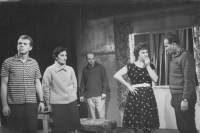I was forced to emigrate by the fear of communist revenge

Download image
Otto Macák was born on 12 May 1945 in Jirkov, Chomutov region. His father died in Russian imprisonment during the war, his mother died ten months after his birth. He was brought up by his maternal aunt. After graduating from the secondary industrial school in Chomutov, he joined the basic military service. He played football well, so he enlisted in Chomutov, where he played goalkeeper for the local Dukla, and later for Dukla Žatec. At the army, he founded the Zenit 2 dance orchestra and a recitation club. After the military service he joined the Tušimice Power Plant and married Irena Červenková, they moved to Kadan. He promoted the ideas of the Prague Spring at the Tusimice power plant. He co-founded the Club of Committed Non-Partisans in the Chomutov region. At the age of twenty-three he became chairman of the company committee of the ROH Tušimice Power Plant and refused to join the Communist Party. After 21 August 1968, when Czechoslovakia was occupied by the Warsaw Pact troops, he feared communist revenge. Therefore, he and his wife decided to emigrate to their relatives in West Germany. The local press wrote about him as a traitor. In Germany, he worked for forty years for an engineering firm. He returned to the Czech Republic in 1990 and since then he has lived alternately in Germany and in the cottage settlement of Pyšná near Vysoké Peka in the Chomutov region, where he lived in November 2022.












